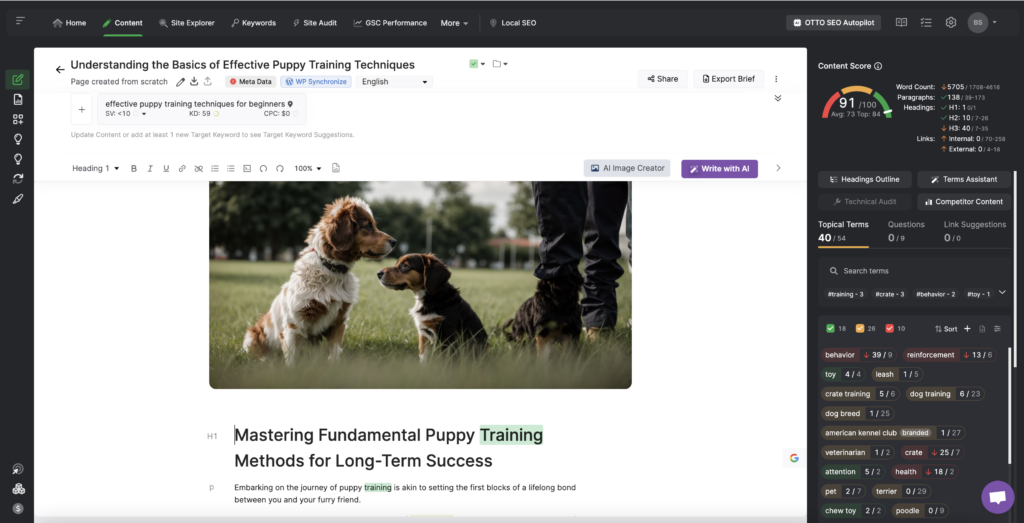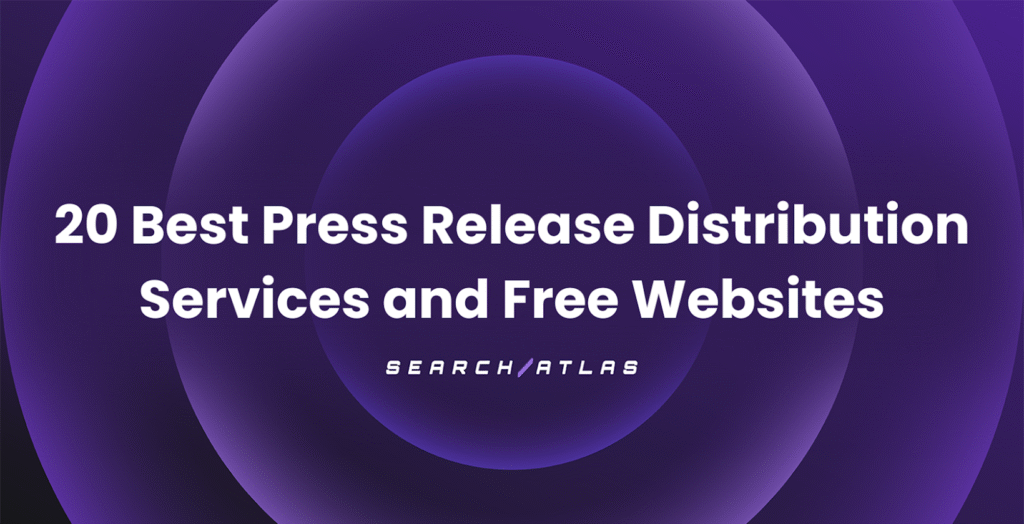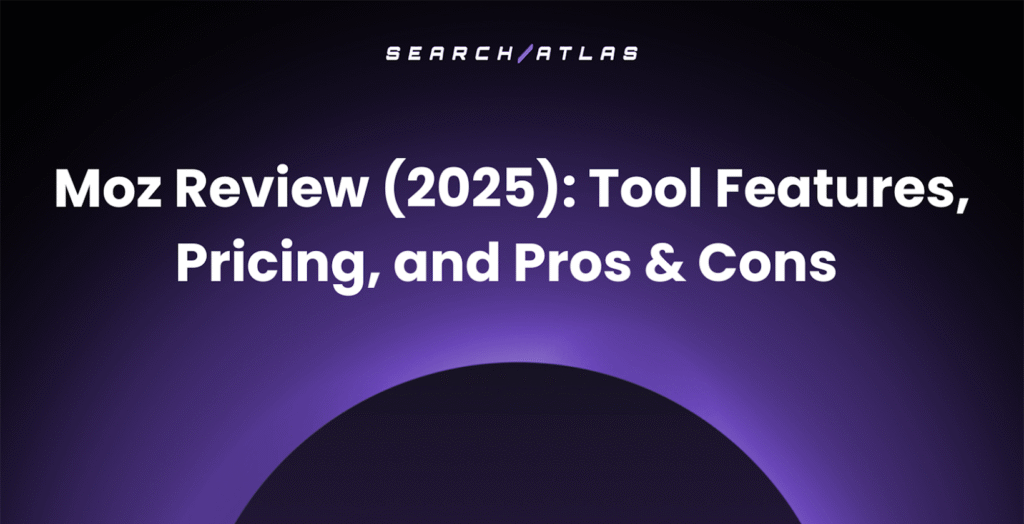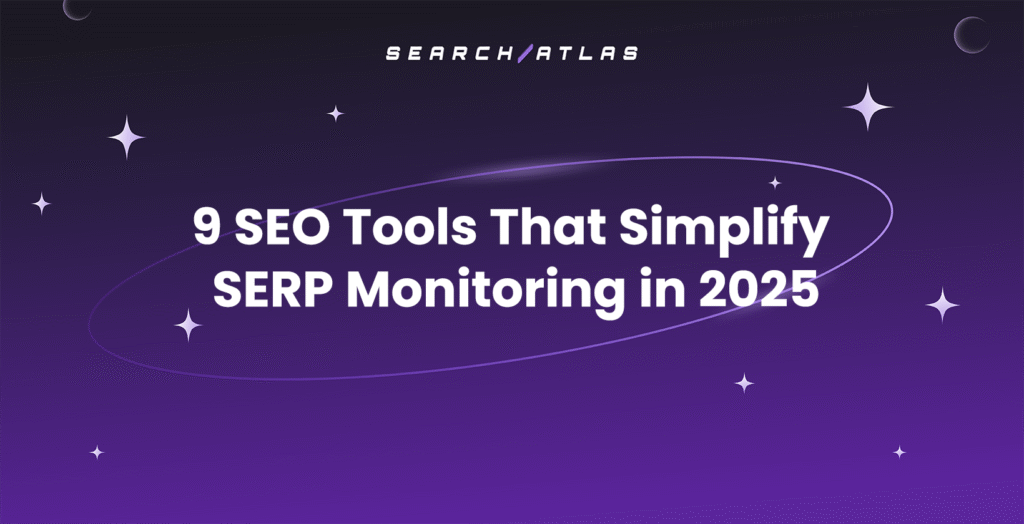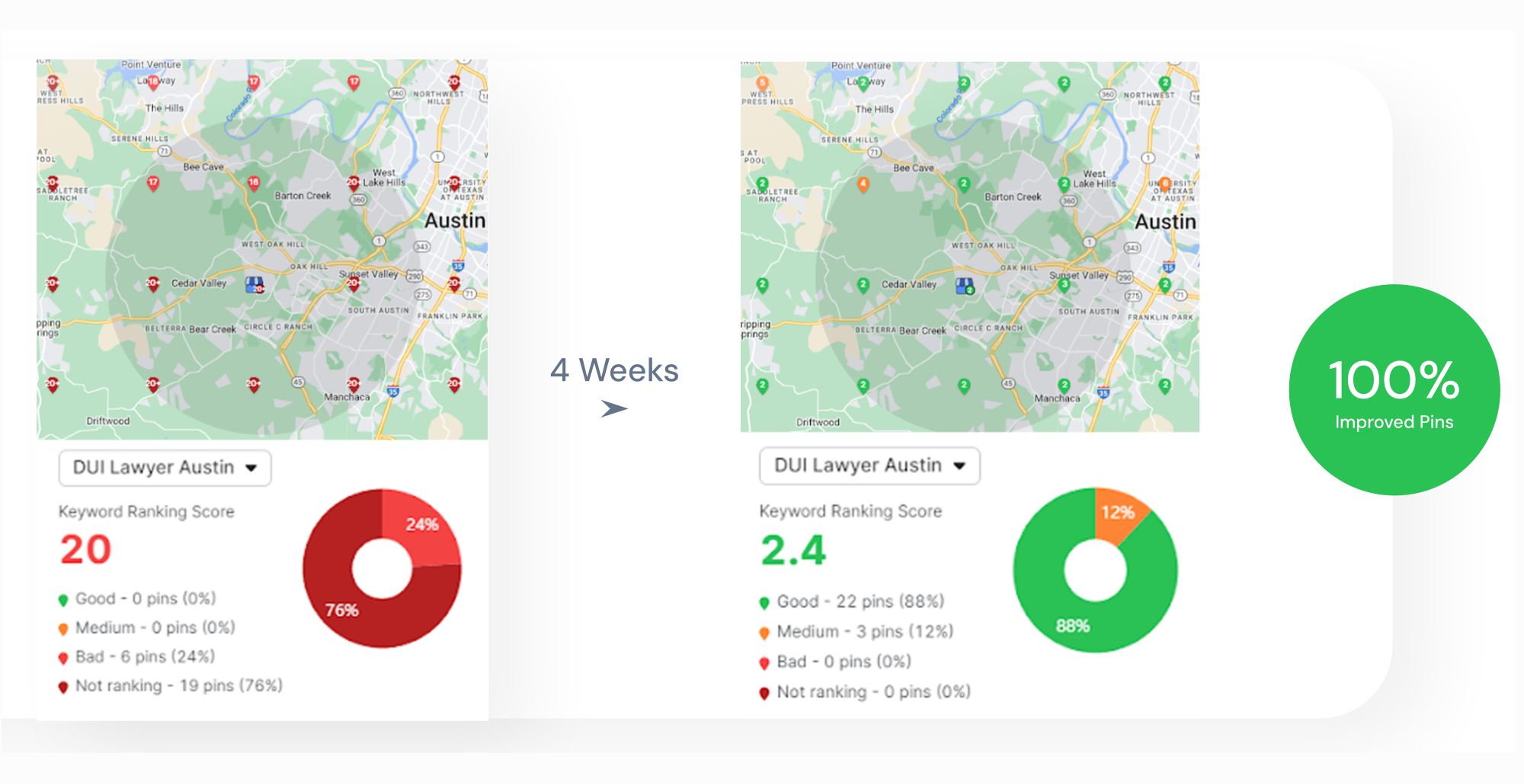Keeping track of your website’s rankings can feel like a never-ending battle. With search engines constantly updating their algorithms and competitors fighting for the top spots, you need a reliable tool to stay ahead.
The problem? Many rank tracking tools come with hefty price tags. 💸
But here’s the good news: You don’t have to spend a fortune to monitor keyword rankings, track SERP changes, and gain valuable SEO insights.
Whether you’re an agency, a small business owner, or an SEO enthusiast, there are affordable (and even feature-packed) tools that can do the job without draining your budget.
In this post, we’ll dive into 10 of the best rank tracking tools for 2025—covering their key features, pricing, and why they’re worth considering for your SEO strategy!
What to Look for in a Rank Tracking Tool
Rank tracking tools vary widely in features. Some offer basic tracking, while others provide deep insights that can shape your entire SEO strategy. So, how do you choose the right one?
Ultimately, a great rank tracking tool should go beyond just showing where your keywords rank. You must look for features like:
- Keyword Accuracy and Update Frequency: Daily or on-demand updates ensure you’re working with fresh data.
- Competitor Tracking: Understand how your rankings compare to others in your industry.
- Local SEO and Mobile Rankings: Essential for businesses targeting specific locations or mobile users.
- SERP Feature Tracking: Identify when your site appears in featured snippets, knowledge panels, and other search results.
- Historical Data and Trends: Spot long-term ranking patterns and make data-driven decisions.
Also, it’s important to consider long-term value over cost. Affordability isn’t just about the upfront price—it’s about long-term value. Can the tool scale to meet your SEO needs? Does it offer advanced features when you’re ready to grow?

10 Powerful Rank Tracking Tools for 2025
The best rank tracking tools do more than just show where you stand. They provide real-time updates, competitor insights, and SERP analysis to help you adapt and stay ahead. In this list, we’ll explore powerful tools designed to track rankings accurately and give you the data you need to improve your search performance.
1. Search Atlas
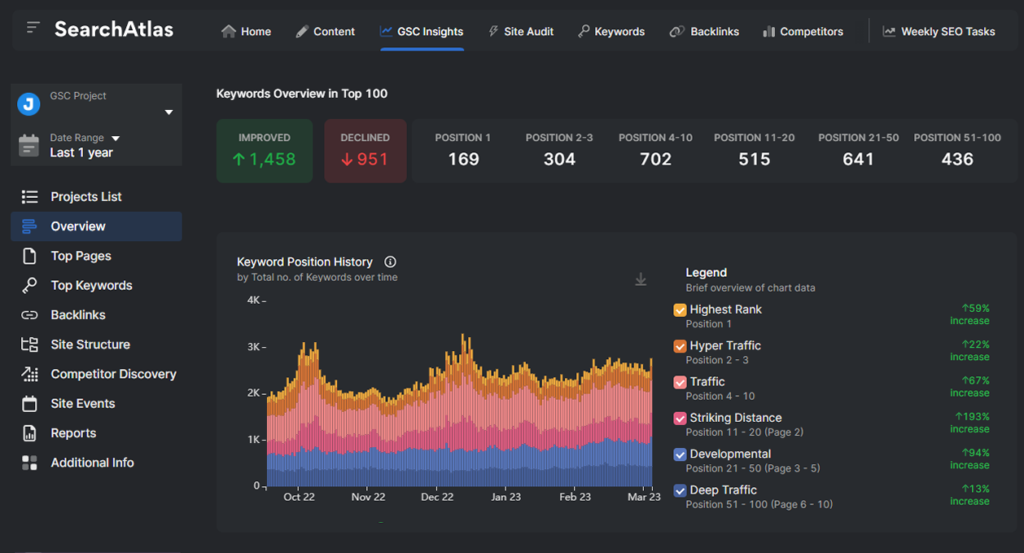
Search Atlas is a powerful all-in-one SEO platform that goes beyond traditional rank tracking. Designed for marketers, businesses, and agencies, it offers a suite of over 40 tools to streamline SEO, content optimization, and competitor analysis.
Unlike many rank trackers that rely on web scraping—often leading to inaccurate results or blocked data—Search Atlas integrates directly with Google Search Console. This ensures more precise keyword tracking.
Beyond rank tracking, Search Atlas provides advanced research tools for backlink analysis, keyword discovery, and site audits.
Its automation features, including an AI-powered SEO assistant, OTTO, help optimize web pages, fix broken links, and manage citations with minimal effort. The platform also offers robust local SEO capabilities, allowing users to analyze keyword rankings locally.

Overall, what sets Search Atlas apart is its versatility—it combines rank tracking, keyword research, backlink analysis, content optimization, and automated SEO tools under one platform.
This makes it a cost-effective alternative to premium solutions that charge extra for individual features.
Popular features
- Rank Tracker: Monitors keyword rankings with historical performance insights using Google Search Console data for higher accuracy.
- Keyword Tools: Provides search volume, CPC, keyword difficulty, and intent analysis, plus Keyword Gap Analysis.
- Backlink Analyzer: Examines referring domains and includes Link Gap Analysis, Bulk URL Analyzer, and Topic Relevance tools.
- Local SEO Tools: Tracks keyword rankings at a hyper-local level and helps with citation management.
- Reporting Tools: Offers white-label reporting and in-depth performance analysis.
- Content Genius: Supports content planning, optimization, and one-click publishing with AI assistance.
- OTTO: Automates SEO tasks like fixing broken links and improving on-page elements.
Limitations
- Some advanced tools may require a learning curve, though onboarding support is available.
- OTTO AI Assistant setup takes initial configuration, especially for large websites, but delivers long-term automation benefits.
Pricing
| Starter plan | Growth plan | Pro plan | |
| Price | $99/month | $199/month | $399/month |
| Free OTTO activation | 1 | 1 | 3 |
| User seats | 2 | 3 | 5 |
| Automated GBPs | 3 | 10 | 25 |
| GSC Site Projects | 5 | 15 | 100 |
| GSC Keywords Tracking per Site | Top 10,000 | Top 100,000 | Top 1,000,000 |
| GSC Pages | Top 2000 | Top 100,000 | Top 1,000,000 |
| Keyword Rank Tracking Projects | 20 | 50 | 1000 |
| Keyword Rank Tracking | 1000 keywords | 2500 keywords | 5000 keywords |
| Keyword, Competitor & Backlink Research Tools | Unlimited use | Unlimited use | Unlimited use |
| Keyword Explorer, Keyword Magic, Rank Tracker, and Keyword Gap Analysis | Unlimited use | Unlimited use | Unlimited use |
Search Atlas reviews
- G2: 4.8/5 (91)
- Capterra: 4.9/5 (63)
2. AccuRanker
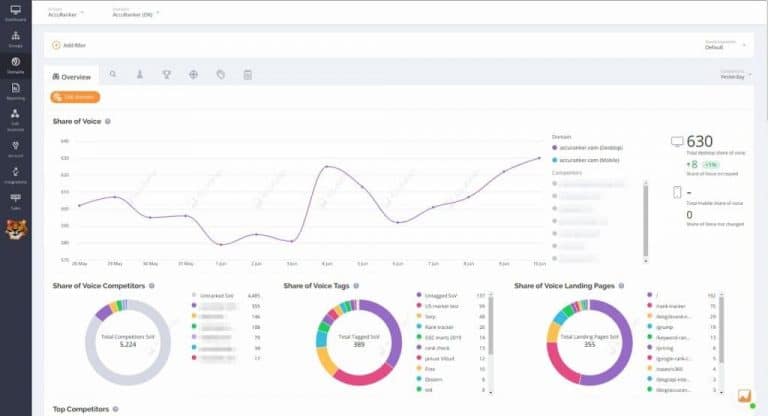
AccuRanker is a dedicated rank tracking tool known for its speed and accuracy. Designed for SEO professionals and agencies, it provides real-time keyword tracking, historical data analysis, and competitor insights.
The platform offers instant on-demand updates, ensuring users always have the latest ranking data.
AccurRanker also supports local and global rank tracking, making it a choice for businesses targeting specific regions. Its integration with Google Search Console, Google Analytics, and third-party reporting tools enhances data analysis and simplifies reporting.
Popular features
- Instant Rank Updates: Check keyword positions in real time without waiting for scheduled refreshes.
- Competitor Benchmarking: See how your rankings stack up against competitors.
- SERP Feature Monitoring: Track when your site appears in featured snippets, knowledge panels, and more.
- API & Data Studio Integration: Streamline reporting with powerful data connections.
- Local & Global Tracking: Analyze keyword performance in specific cities or across countries.
Limitations:
- Pricing can be steep for smaller businesses.
- Primarily focused on rank tracking, with limited additional SEO features.
Pricing
AccuRanker follows a flexible pricing model where all features are included in every plan—the cost is based solely on the number of keywords you track.
Prices range from $129 per month for 1,000 keywords to $2,769 per month for 50K. There is also custom pricing for enterprises with larger needs.
AccuRanker reviews
- G2: 4.8/5 (223)
- Capterra: 4.9/5 (329)
3. SE Ranking
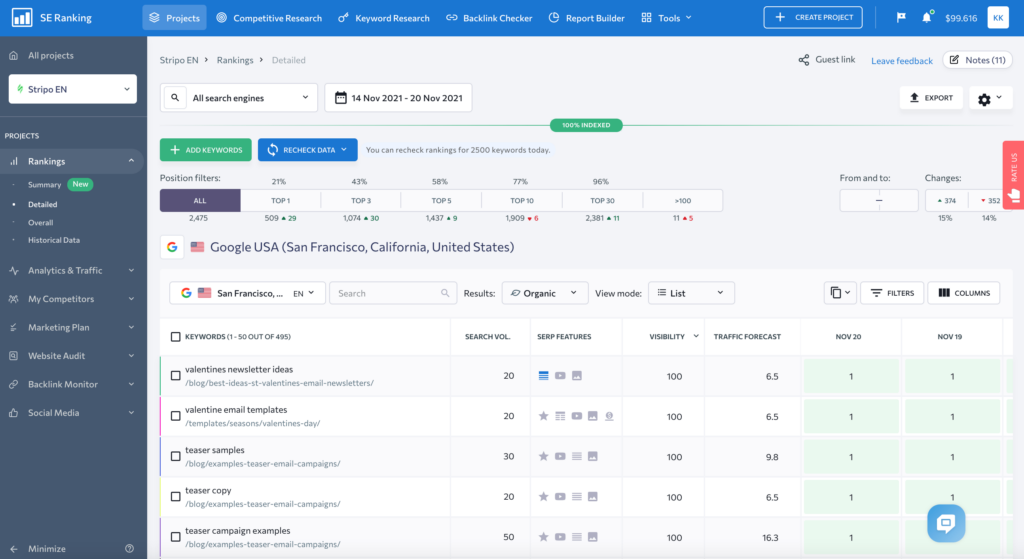
SE Ranking offers a well-rounded approach to rank tracking, combining accuracy with a user-friendly experience. It provides daily keyword position updates across multiple search engines and allows users to monitor rankings at national, regional, and even street-level precision.
Beyond rank tracking, SE Ranking includes additional SEO tools like site audits, backlink monitoring, and competitor research, making it a versatile choice for businesses and agencies looking for an all-in-one solution.
Its white-label reporting also makes it a popular option for SEO professionals managing multiple clients.
Popular features:
- Daily Rank Tracking: Get updated keyword positions daily with detailed historical data.
- Local & Global Monitoring: Track rankings across countries, regions, and even specific ZIP codes.
- Competitor Analysis: Compare your rankings with up to five competitors.
- Backlink Monitoring: Keep an eye on gained and lost backlinks.
- Content Marketing Tools: Supports content creation and optimization with AI-driven insights and solutions.
Limitations
- The interface, while feature-rich, may feel overwhelming for beginners.
- Rank tracking frequency is limited on lower-tier plans.
Pricing
- Essential Plan: $65 per month, 1 manager seat, 5 projects, 500 keywords tracked daily, rank tracker, competitive & keyword research.
- Pro Plan: $119 per month, everything in Essential, 3 manager seats, 30 projects, 2,000 keywords tracked daily, on-page and SERP analysis, Looker Studio integration, and Share of Voice metric.
- Business Plan: $259 per month, everything in Pro, 5 manager seats, unlimited projects, 5,000 keywords tracked daily, maximized data reach, keyword database expansion, and dedicated customer support.
SE Ranking reviews
- G2: 4.8/5 (1,355)
- Capterra: 4.7/5 (284)
4. Rank Ranger
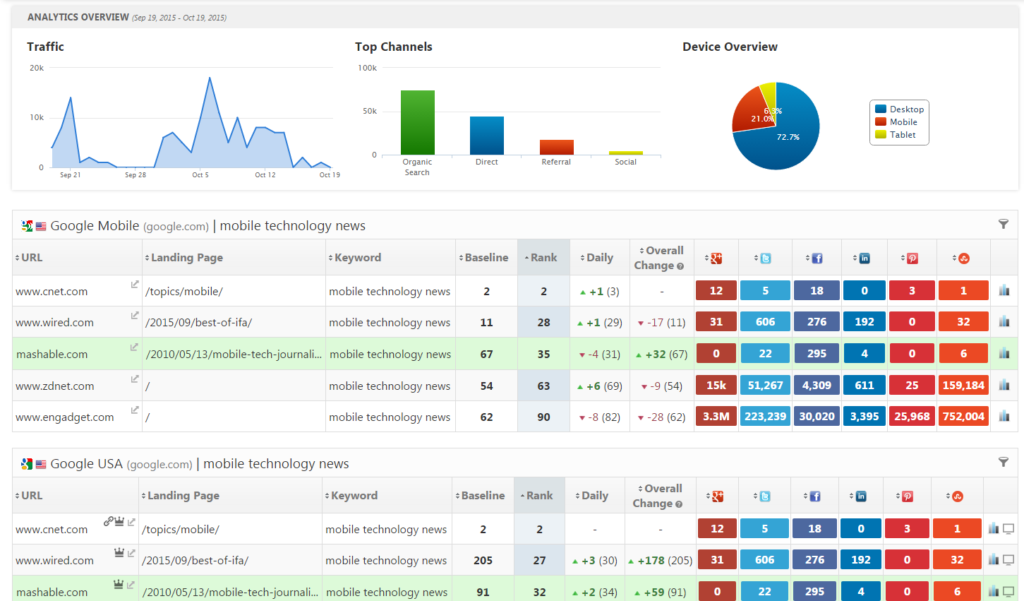
A Similarweb company, Rank Ranger is a highly customizable rank tracking tool that caters to agencies and enterprises needing in-depth data insights. It provides daily keyword tracking across multiple search engines.
It has advanced SERP analysis that highlights changes in rankings, featured snippets, and other search result elements. One of its standout features is its flexible reporting suite, which allows users to create fully customized dashboards and branded reports.
Rank Ranger also integrates seamlessly with Google Analytics and Search Console, offering a complete view of SEO performance.
Popular features:
- Daily Rank Tracking: Monitor keyword positions with historical trend analysis.
- Advanced SERP Insights: Track featured snippets, local packs, and other SERP elements.
- Custom Reporting: Build personalized, white-label reports with extensive visualization options.
- Competitor Tracking: Compare keyword performance against competitors in the same niche.
- API Access: Pull ranking data into external dashboards and reporting tools.
Limitations:
- The interface can be complex for those unfamiliar with advanced SEO metrics.
- Some reviews say that the reports may not be consistent with live results.
Pricing
Need to contact the sales team for a quote.
Rank Ranger reviews
- G2: 4.1/5 (11)
- Capterra: 4.8/5 (5)
5. Mangools
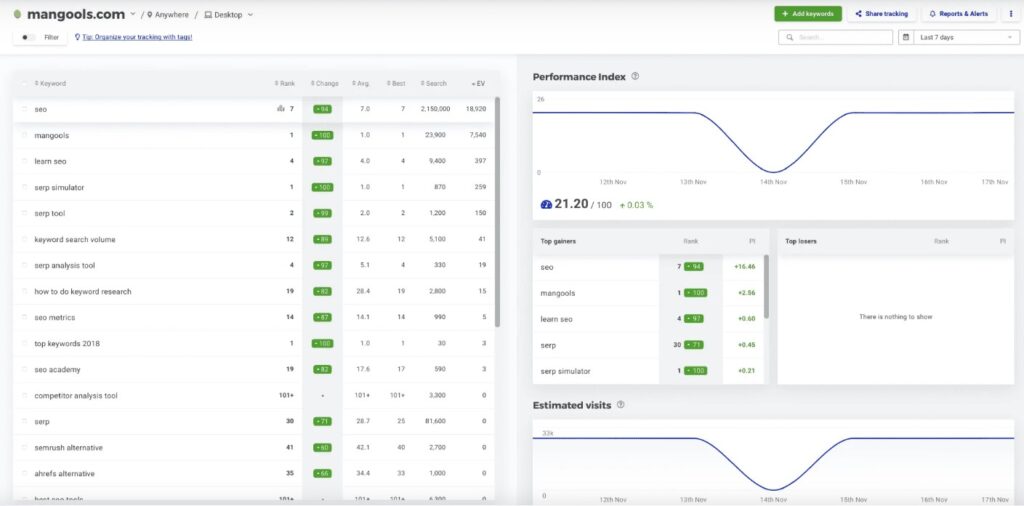
Mangools is a simple yet powerful SEO suite, mainly designed for those new to SEO or small businesses looking for an affordable, easy-to-use rank tracking solution.
The tool to focus on here is SERPWatcher, which allows users to track keyword positions across multiple search engines like Google, Bing, and Yahoo.
With it, you get clear and concise ranking data, historical trends, and detailed reports, making it easier to track your SEO progress over time.
Mangools also includes other helpful tools for keyword research (KWFinder), backlink analysis (LinkMiner), and site audits (SiteProfiler), all designed to improve your website’s SEO performance.
Popular features
- KWFinder: Discover low-competition keywords with search volume and difficulty scores.
- SERPChecker: Analyze Google search results to evaluate competition and ranking difficulty.
- LinkMiner: Get detailed backlink analysis with trust and citation flow metrics.
- SERPWatcher: Track keyword rankings with daily updates and a simple dashboard.
- SiteProfiler: Check domain authority, backlink profile, and top-performing content insights.
Limitations
- Limited features compared to more advanced SEO platforms.
- Lacks some integrations needed for larger businesses or enterprises.
Pricing
- Basic Plan: $49 per month, 100 SERP lookups/day, 200 keyword suggestions/search, 100,000 backlink rows monthly, and more.
- Premium Plan: $69 per month, 500 SERP lookups/day, unlimited keyword suggestions/search, 500,000 backlink rows monthly, and more.
Agency Plan: $129 per month, 1,200 SERP lookups/day, unlimited keyword suggestions/search, 1,200,000 backlink rows monthly, and more.
Mangools reviews
- G2: 4.7/5 (87)
- Capterra: 4.8/5 (88)
6. Moz Pro
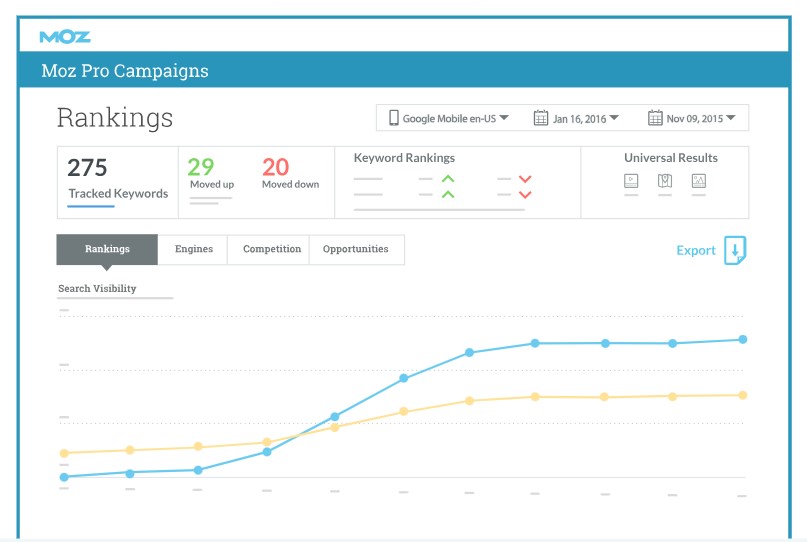
Moz Pro is a comprehensive SEO platform with a variety of features designed for businesses looking to improve their organic search performance. Its rank tracking tool helps users track keyword positions and provides valuable insights into keyword difficulty, search volume, and click-through rates.
Moz Pro also includes tools for site audits, backlink analysis, and competitor tracking, making it a versatile choice for marketers who want to manage multiple aspects of their SEO efforts.
Popular features
- Keyword Explorer: Track keyword rankings with detailed insights into difficulty, volume, and CTR.
- Mobile vs. Desktop Tracking: Track keyword rankings for both mobile and desktop, with the option to drill down to national and local levels.
- Site Audits: Identify and fix on-page issues with in-depth site audits.
- Backlink Analysis: Discover and analyze backlinks, and monitor link growth over time.
- Competitor Research: Compare your rankings against competitors and identify opportunities.
Limitations
- The updates are sometimes not in real-time, which can be damaging for an SEO strategy.
- The interface might not be as intuitive for beginners compared to simpler tools.
Pricing
- Starter Plan: $49 per month, 1 user, 1 tracked site, 50 keywords/month, 20K pages crawled/month, basic SEO tools.
- Standard Plan: $99 per month, 1 user, 3 tracked sites, 300 tracked keywords per month, and 400K pages crawled per month.
- Medium Plan: $179 per month, 2 users, 10 tracked sites, 1,500 tracked keywords per month, and 2 million pages crawled per month.
- Large Plan: $299 per month, 3 users, 25 tracked sites, 3,000 keywords/month, 5M pages crawled/month, increased quotas on SEO tools.
Moz Pro reviews
- G2: 4.3/5 (569)
- Capterra: 4.5/5 (349)
7. SEO PowerSuite
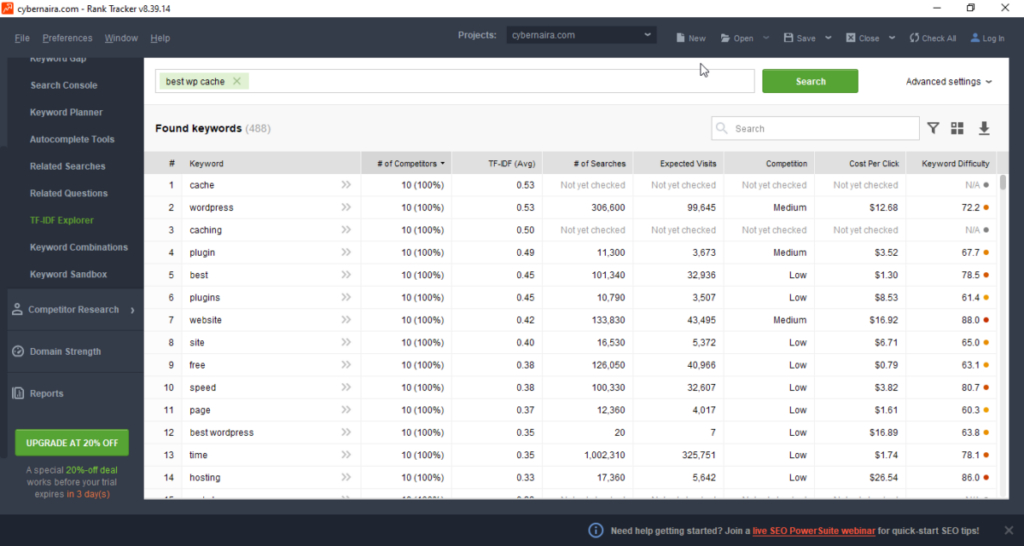
SEO PowerSuite is an all-in-one SEO toolset designed to help you manage and optimize various aspects of your SEO strategy. Its rank tracking tool, Rank Tracker, is highly customizable and supports tracking across multiple search engines, including Google, Yahoo, Bing, and even YouTube.
The platform is unique for offering a desktop-based solution that provides in-depth data and insights. It includes features for keyword research, backlink analysis, site audits, and competitor tracking, making it a versatile tool for SEO professionals.
Popular features
- Rank Tracker: Track keyword rankings across multiple search engines and countries.
- Keyword Research: Discover keyword opportunities with search volume and competition data.
- Backlink Analysis: Analyze backlinks, track referring domains, and identify link-building opportunities.
- Competitor Research: Monitor competitor keyword rankings and backlink strategies.
- SEO Reports: Generate custom reports to track progress and performance over time.
Limitations
- The desktop-based setup may not be as convenient for users who prefer cloud-based solutions.
- The interface can be less intuitive compared to some cloud-based tools.
Pricing
- Professional Plan: $60 per month, unlimited projects, track unlimited keywords, crawl and audit entire websites, track and analyze unlimited backlinks, and monitor 5 competitors per project.
- Enterprise Plan: $140 per month, everything in Professional, white-label SEO reports, monitor 40 competitors per project, and priority support.
SEO PowerSuite reviews
- G2: 4.6/5 (548)
- Capterra: 4.5/7 (378)
8. Serpstat
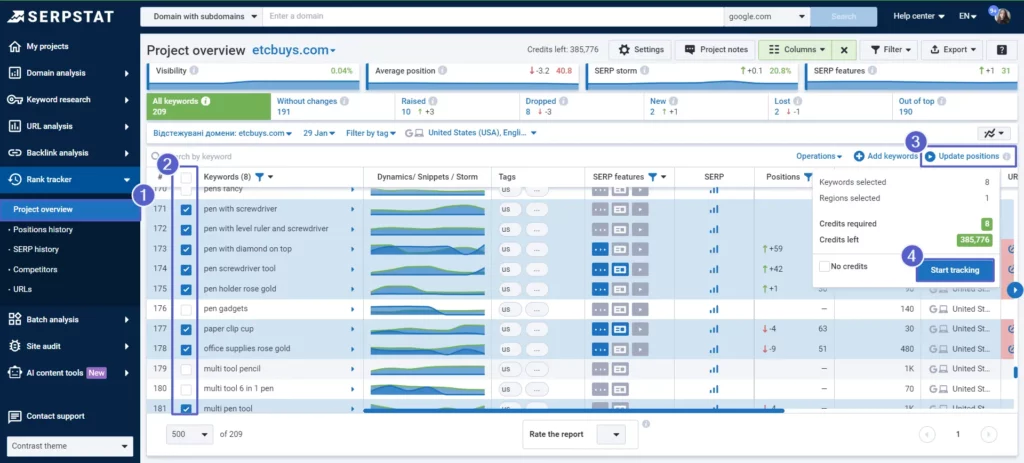
Serpstat is a robust SEO platform offering a comprehensive suite of tools for rank tracking, keyword research, backlink analysis, and competitor research. Its rank tracking feature allows users to track keywords across various search engines and geographic regions, providing detailed insights into keyword performance over time.
The platform also includes additional tools for content analysis, site audits, and more, all designed to help users improve their search engine rankings and online visibility.
Popular features
- Rank Tracking: Monitor keyword rankings across search engines and countries with daily updates.
- Keyword Research: Discover new keyword opportunities with detailed search volume, CPC, and competition data.
- Backlink Analysis: Analyze your backlinks and track competitor link profiles.
- Competitor Research: Uncover competitor keyword strategies and backlink sources.
- Site Audits: Perform detailed site audits to identify and resolve SEO issues.
Limitations
- The interface can be overwhelming for beginners due to the large number of features.
- Some advanced features only come with additional fees.
Pricing
- Individual Plan: $69 per month, 10,000 position checks, 5 projects, 100 searches for sites, keywords, and links per day.
- Team Plan: $129 per month, 50,000 position checks, unlimited projects, 500 searches for sites, keywords, and links per day.
- Agency Plan: $499 per month, 500,000 position checks, unlimited rank tracker and site audit, 1.5M pages to audit, 250k tools credit, API access.
Serpstat reviews
- G2: 4.6/5 (462)
- Capterra: 4.5/7 (169)
9. Ahrefs
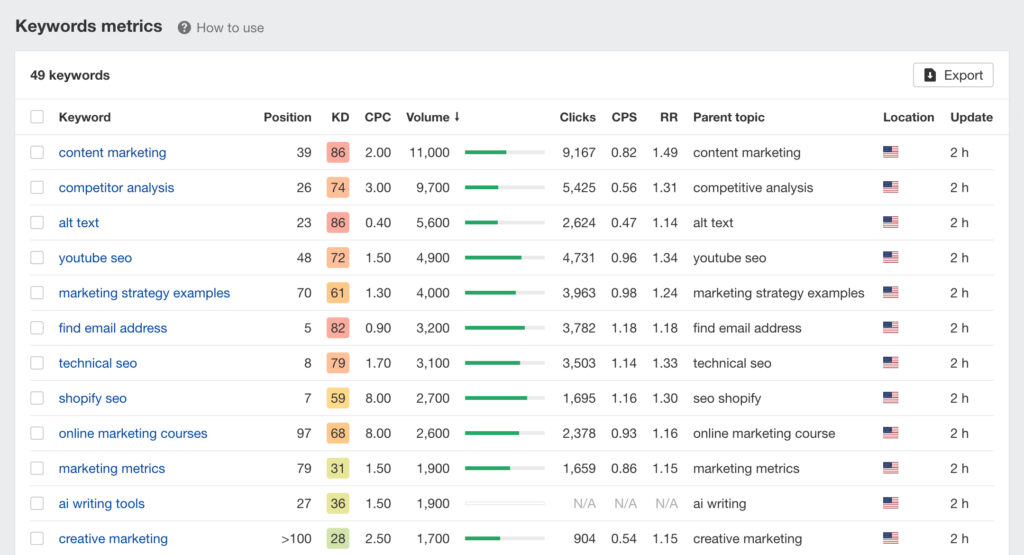
Ahrefs is one of the most well-known SEO platforms, offering a robust set of tools for rank tracking, backlink analysis, and keyword research. Its Rank Tracker is especially popular for tracking keyword rankings across multiple search engines and countries.
Ahrefs also offers detailed insights into keyword performance, organic search traffic, and the competitive landscape.
Popular features
- Rank Tracker: Track keyword rankings across global search engines with real-time updates.
- Keyword Research: Find keyword opportunities, analyze competition, and discover related terms.
- Backlink Analysis: Monitor backlinks and analyze link growth over time.
- Site Audits: Identify on-page SEO issues and monitor technical health.
- Competitor Research: Examine competitors’ top-ranking keywords and backlink strategies.
Limitations
- Ahrefs’ pricing can be prohibitive for smaller businesses or those on a tight budget.
- Some users have reported that rank updates may not be as fast as other tools.
Pricing
- Starter Plan: $29 per month, limited access to tools like site explorer, keywords explorer, and site audit.
- Lite Plan: $129 per month, 5 projects, 6 months of historical data, 750 tracked keywords, 100,000 crawl credits
- Standard Plan: $249 per month, 20 projects, 2 years of historical data, 2,000 tracked keywords, 500,000 crawl credits
- Advanced Plan: $449 per month, 50 projects, 5 years of historical data, 5,000 tracked keywords, 1,500,000 crawl credits
Ahrefs reviews
- G2: 4.5/5 (548)
- Capterra: 4.7/5 (572)
10. Semrush
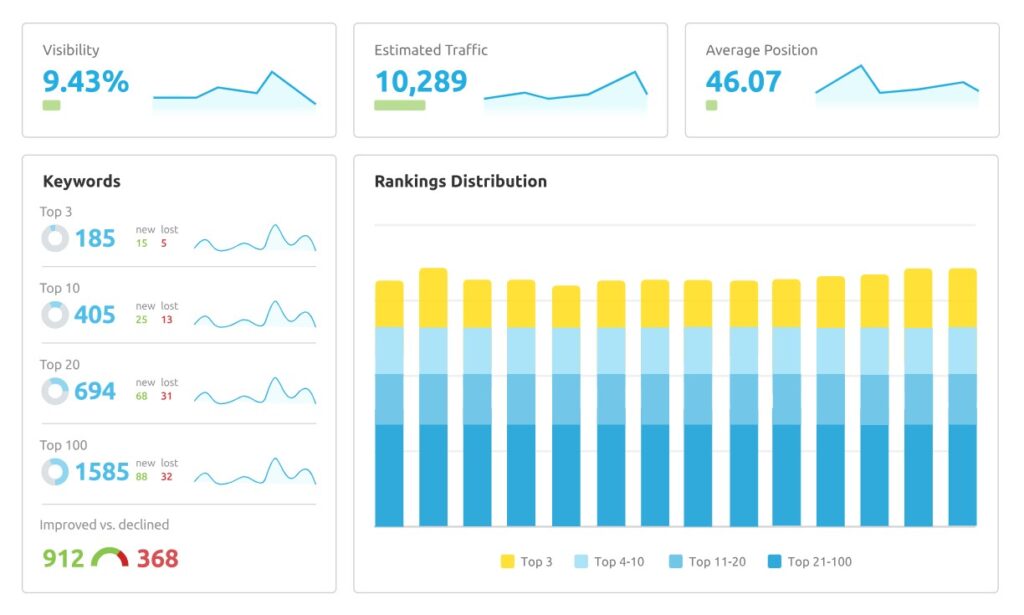
Semrush is one of the leading SEO platforms, offering many tools designed to improve search engine rankings. The Position Tracking tool provides real-time updates, allowing you to track keyword positions across multiple countries and devices.
The platform is popular among digital marketers for its versatility and data-rich environment, offering everything from keyword research to site audits.
Popular features
- Rank Tracking: Track keyword rankings across search engines and devices, with daily updates and historical data.
- Keyword Research: Analyze search volume, CPC, competition, and keyword difficulty.
- Backlink Analysis: Monitor your backlink profile and identify new link-building opportunities.
- Competitor Research: Explore competitor keyword strategies, organic rankings, and ad spend data.
Limitations
- Semrush is more expensive than many other SEO tools, making it a less viable option for those on a tight budget.
- The lower-tier pricing plans limit the number of keywords and features available, which may not be enough for more advanced SEO needs.
Pricing
- Pro Plan: $139.95 per month, 5 projects, 500 tracked keywords, 10,000 results per report
- Guru Plan: $249.95 per month, 15 projects, 1,500 tracked keywords, 30,000 results per report, access to historical data, content marketing platform, Looker Studio Integration
- Business Plan: $449.95 per month, 40 projects, 5,000 tracked keywords, 50,000 results per report, access to API, and extended limits.
Semrush reviews
- G2: 4.5/5 (2,375)
- Capterra: 4.7/5 (2,272)
Why Search Atlas Outshines All Other Rank Tracking Tools
When it comes to rank tracking, Search Atlas stands out as the most versatile and cost-effective solution. Unlike other tools that rely on scraping methods and risk data inaccuracies, it leverages Google Search Console data for more accurate, sustainable, and bot-proof tracking.
It offers everything you need under one platform, from comprehensive keyword tracking and backlink analysis to detailed competitor research and local SEO insights—all while maintaining affordable pricing.
Whether you’re a small business, a content creator, or an experienced marketer, Search Atlas simplifies the SEO process with its user-friendly interface and powerful features. It’s not just about tracking keywords; it’s about improving your SEO strategy efficiently and effectively.
Ready to take your rank tracking to the next level? Start your free trial of Search Atlas today and experience the power of accurate, all-in-one SEO tracking! 🚀


